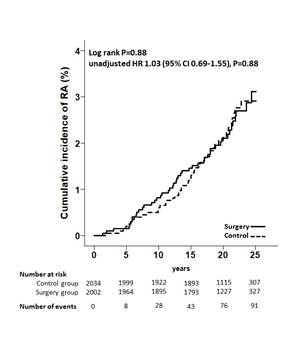Session Information
Date: Monday, October 22, 2018
Session Type: ACR Concurrent Abstract Session
Session Time: 4:30PM-6:00PM
Background/Purpose: Obesity is among the risk factors for rheumatoid arthritis (RA). Bariatric surgery is an effective treatment to achieve weight loss and to prevent obesity-related diseases, such as type 2 diabetes1. Bariatric surgery-induced weight loss in subjects with RA has been associated with a lower disease activity, a decrease in inflammatory markers and a lower use of disease-modifying antirheumatic drugs2. However, the effect of bariatric surgery on the prevention of RA is not known. We have previously shown that bariatric surgery reduces the risk of gouty arthritis and psoriasis in obese subjects3,4. By exploiting a longitudinal study enrolling more than 4000 obese subjects, we aim to determine if bariatric surgery prevents the incidence of RA.
Methods: The Swedish Obese Subjects (SOS) study is a longitudinal controlled trial on the effect of bariatric surgery on the incidence of obesity-related diseases. It includes 4047 obese subjects: 2010 underwent bariatric surgery and 2037 constituted the matched control group. Seven Swedish local ethics review boards approved the study protocol. SOS study participants who developed RA were identified by searching the Swedish National Patient Register. Eleven subjects with prevalent RA at baseline are excluded by the analyses. Patients were followed up until diagnosis of RA, death, migration or end of follow-up (December 2016).
Results: During a follow up for up to 29 years, 92 subjects developed RA. Fifty-one individuals (55%) had a seropositive RA. Forty-seven subjects (2.3%) developed RA in the surgery group compared to 45 subjects (2.2%) in the control group. Bariatric surgery was not associated with the incidence of RA during follow up (log-rank P=0.88; unadjusted Hazard Ratio-HR 1.03, 95% Confidence Interval-CI 0.69-1.55, P=0.88, Figure 1). Similar results were obtained if only subjects with seropositive RA were included in the analysis. Adjustment for confounding factors did not affect the results (HR for bariatric surgery after adjustment for confounding factors 0.95, 95% CI 0.60-1.50, P=0.82). Smoking habit, as well as baseline serum levels of C-reactive protein and erythrocyte sedimentation rate, but not female sex or body-mass index, were associated with the risk of developing RA in this obese population.
Conclusion: In a large cohort of obese subjects followed up for up to 29 years, bariatric surgery does not affect the incidence of RA years.
References:
1.Sjostrom L. J Intern Med 2013;273:219-34.
2.Sparks JA, et al. 2015;67:1619-26.
3.Maglio C, et al. Ann Rheum Dis 2016.
4. Maglio C, et al. Obesity (Silver Spring) 2017;25:2068-73.
Figure 1. Cumulative incidence of RA in the SOS study.
Abbreviations: HR, hazard ratio; C.I., confidence interval.
To cite this abstract in AMA style:
Zhang Y, Maglio C, Rudin A, Carlsson L. Bariatric Surgery Does Not Affect the Incidence of Rheumatoid Arthritis in Obese Subjects [abstract]. Arthritis Rheumatol. 2018; 70 (suppl 9). https://acrabstracts.org/abstract/bariatric-surgery-does-not-affect-the-incidence-of-rheumatoid-arthritis-in-obese-subjects/. Accessed .« Back to 2018 ACR/ARHP Annual Meeting
ACR Meeting Abstracts - https://acrabstracts.org/abstract/bariatric-surgery-does-not-affect-the-incidence-of-rheumatoid-arthritis-in-obese-subjects/

